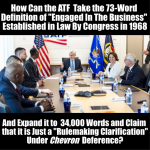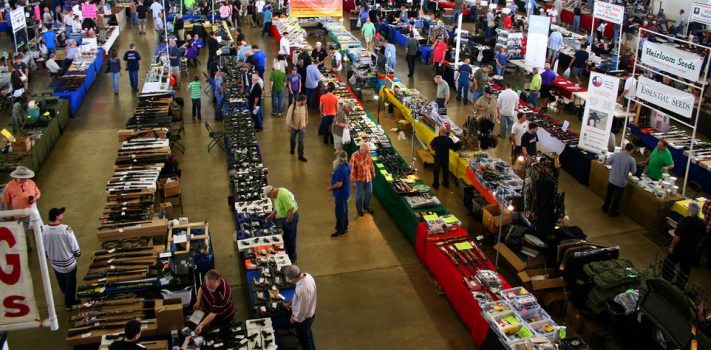I’ve had several readers write to ask me about the ATF’s new 108-Page proposed “Engaged In The Business” rule. On August 31, 2023, the Biden Regime announced that it is attempting to redefine “engaged in the business” of selling firearms. This rulemaking will strongly amplify and greatly expand on the wording of the Gun Control Act of 1968 and the Bipartisan Safer Communities Act (BCSA) of 2022. The latter provides that, as applied to a dealer in firearms, the term “engaged in the business” means “a person who devotes time, attention, and labor to dealing in firearms as a regular course of trade or business to predominantly earn a profit through the repetitive purchase and resale of firearms.”
This proposed rulemaking is a clear violation of our rights in the following ways:
- The 2nd Amendment, because the right to keep and bear arms also implies the right to freely buy and sell them.
- The 4th Amendment, because this rule in effect creates a national gun registry. If all gun sales must go through dealers, and dealers are required to keep permanent records, then the U.S.A. will have a de facto registry.
- The 10th Amendment, because it encroaches on the right of the several States to have free commerce in arms.
- The Interstate Commerce Clause, because it specifically targets intrastate private-party commerce in used guns. There is no legitimate Federal jurisdiction over any household goods that are no longer moving in interstate commerce.
- The Supreme Court’s 2022 Bruen decision, because there are no pre-1791 laws that are even roughly analogous.
- The Separation of Powers clauses (Article I.S1.3.1) of the Constitution, because only Congress can create new laws.)
Someone who sells or even makes an “offer to engage” in even just a single transaction could be prosecuted for failing to acquire a FFL, and risk a felony prosecution.
The 90-day comment period is now open.
Because the Bidenistas are likely to ignore the public’s objections received in the comments — just like they ignored them with their Chevron Deference-based rules on Bump Stocks, Frames/Receivers, Forced Reset Triggers, and Arm Braces. So I anticipate that this 108-page proposed rule could become “law” before the end of 2023. This rule will absolutely destroy gun shows, as we now know them.
(See the rule text.)
Stock Up!
Private-party gun sales are still legal in about 33 States. But if this rule is enacted, it will have a tremendous chilling effect on private party sales. So, I strongly recommend that you accelerate your private party purchasing of guns to round out your personal collection — that is, if your state law allows it. Plan to attend a lot of gun shows before the end of the year.
Beware: The firearms purchase privacy window is about to close. So, stock up!
 Presently, Americans can “vote with their feet’ if they dislike bans on private party gun sales enacted at the state level. Roughly 33 states still allow private party sales without a background check and permanent paperwork (de facto registration) from the government. But if this new 32,000-word “clarifying rule” is enacted, then it will effectively make most intrastate private party sales of used guns illegal in all 50 states.
Presently, Americans can “vote with their feet’ if they dislike bans on private party gun sales enacted at the state level. Roughly 33 states still allow private party sales without a background check and permanent paperwork (de facto registration) from the government. But if this new 32,000-word “clarifying rule” is enacted, then it will effectively make most intrastate private party sales of used guns illegal in all 50 states.
Again, the proposed rule states that selling even just one gun might make someone a dealer. (See page 27 of the rule text.) I must ask: How could selling one gun possibly be seen as “repetitive”?
Currency Inflation Makes Us All Profiteers
By shifting the core meaning of the “engaged in the business” portion of the law away from “a regular course of trade or business to predominantly earn a profit through the repetitive purchase and resale of firearms” toward just any casual transactions “realizing a profit” ensnares just about everyone who might want to sell one of the used guns in their personal collection. Why? Because inflation is inexorable. The U.S. Dollar loses an average of about 5% of its purchasing power each year. That means that ALL guns go up in dollar value every year. Thus, making an “on-paper” profit is bound to happen.
Here is an example, from my own life: In 1981, when I had just turned 21 years old, I bought my first handgun: a Smith & Wesson Model 28 .357 Magnum revolver. It was new in the factory box from, a local FFL storefront dealer for the princely sum of $212. That same gun, today, even in used condition is now worth around $950. So, If I were to sell lt right at its current replacement cost, then I’d have a supposed “profit” of $738, even though I’d essentially just be breaking even. To avoid any appearance of making a “profit”, then the ATF would expect me to sell that revolver for $212.
Besides profitability, the ATF throws all sorts of other strange “factors” into the determination of who might be considered a hobbyist versus a “dealer”, in their proposed rules. The proposed rule states:
“…a person will be presumed to be engaged in the business of dealing in firearms when the person:
(1) sells or offers for sale firearms, and also represents to potential buyers or
otherwise demonstrates a willingness and ability to purchase and sell additional
firearms;
(2) spends more money or its equivalent on purchases of firearms for the purpose
of resale than the person’s reported taxable gross income during the applicable period of
time…
…repetitively sells or offers for sale firearms—
(A) within 30 days after they were purchased;
(B) that are new, or like new in their original packaging; or
(C) that are of the same or similar kind (i.e., make/manufacturer, model,
caliber/gauge, and action) and type (i.e., the classification of a firearm as a rifle,
shotgun, revolver, pistol, frame, receiver, machinegun, silencer, destructive
device, or other firearm).”
Making Factory Boxes An Issue?
It is hard to believe that the new rule specifically calls out keeping original factory packaging as somehow signaling intent to operate as a “dealer.” That is outrageous! Everyone knows that keeping factory boxes is a wise way of maximizing the long-term collector’s value of any gun. The first question out of the mouth of any serious collector considering a private party purchase is: “Do you have the original box?” So one of the net effects of this proposed rule is that collectors would then feel obliged to throw away the factory boxes for guns in their collections, before re-selling them. Multiply that by a few million used gun transactions, and the ATF is in effect demanding that we collectively forfeit hundreds of millions of dollars from the value of our gun collections. That is truly evil, showing malice against the best interest of legitimate gun collectors.
The Intent of Congress
Congress succinctly defined the term “engaged in the business” (as applied to a dealer in firearms) as:
(21) The term “engaged in the business” means… …(C) as applied to a dealer in firearms, as defined in section 921(a)(11)(A), a person who devotes time, attention, and labor to dealing in firearms as a regular course of trade or business to predominantly earn a profit through the repetitive purchase and resale of firearms, but such term shall not include a person who makes occasional sales, exchanges, or purchases of firearms for the enhancement of a personal collection or for a hobby, or who sells all or part of his personal collection of firearms.
That is a fairly clear and precise definition. But the arcane and incredibly lengthy re-definition just recently proposed by the ATF includes several catch-all phrases, amplifications, and interpretations that could ensnare millions of colleagues and hobbyists into being called “dealers”. This could make them unwitting felons, subject to federal prosecution, facing huge fines and lengthy prison terms. This was NOT the intent of Congress in 1968 and it is a gross executive branch misuse of Chevron deference. It is also noteworthy that the entire doctrine of Chevron deference is currently before the U.S. Supreme Court, and it is very likely to be struck down.
Post Objections and Contact Your Representatives!
I urge my readers to politely post your objections to the public comments page. They will probably be ignored, but we cannot become apathetic about this.
Also, please contact both the U.S. Senators for your state and your Congressman. Politely tell them how you feel about this executive branch overreach. – JWR










